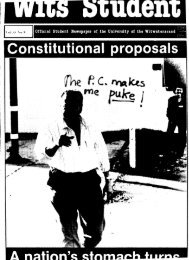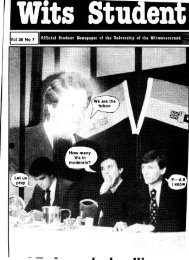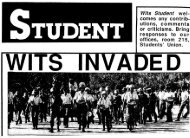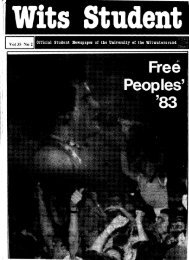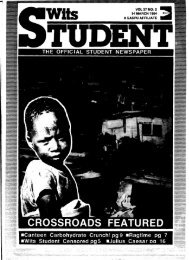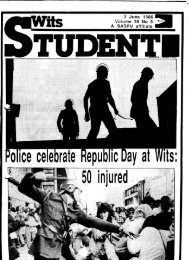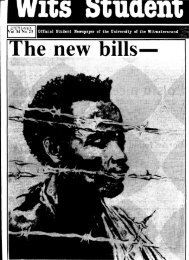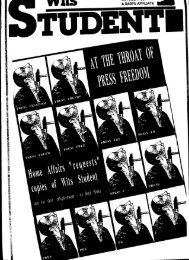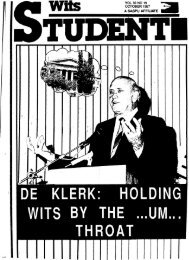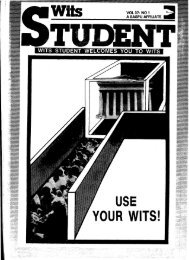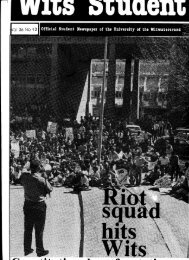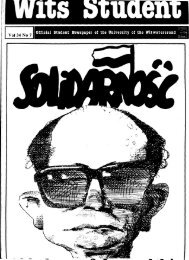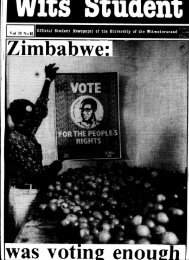emergency - Computer Science
emergency - Computer Science
emergency - Computer Science
You also want an ePaper? Increase the reach of your titles
YUMPU automatically turns print PDFs into web optimized ePapers that Google loves.
il IITU'P f Efif I T'I'58 E EFSEffiil<br />
The shape of things<br />
Repression is the key to establishing the new Regional Services<br />
Councils - building blocks for a future apartheidsociety.<br />
According to leading SADF<br />
figures, the SADF's new combat<br />
plane, the Cheetah, compares<br />
favourably with the best in the<br />
world in terms of its speed,<br />
weapons systems and<br />
monoeuvrability.<br />
The unveiling of the Cheetah last<br />
week served as a morale booster<br />
for government supporters and<br />
right wingers generally.<br />
At the same time it provided a<br />
sobering insight into how the<br />
government intends to pave the<br />
way forward to the future of peace<br />
and prosperity which government<br />
leaders continue to talk about.<br />
Whilst &e Cheetah may appear to<br />
be invincible, the governments<br />
reform plans do not present a<br />
similar pi*ure of infallibiiity.<br />
Reform, in case you've<br />
forgotten, is the process by which<br />
PW Botha undertook to lead all<br />
South Africans towards a future of<br />
murual goodwill and stability.<br />
Considering the prevailing<br />
circumstances, you might be<br />
forgiven for being under the<br />
'reform'<br />
impression that the<br />
process had fallen by the wayside.<br />
In fact 'reform' continues and<br />
has in many ways picked up in pace<br />
over the course of the past year.<br />
RSC's<br />
One of the key elements of the<br />
govemments reform package is the<br />
proposed creation of Regional<br />
Service Councils (RSCs).<br />
Understanding how the proposed<br />
RSCs fit in with other recent steps<br />
taken by the government, such as<br />
the scrapping of the pass laws, the<br />
disbanding of the regional<br />
Cevelopment boards, the creation<br />
of new Executive Commrrrees as<br />
substitutes for the Provincial<br />
Councils, and the adoption of what<br />
the government describes as a<br />
policy of 'orderly urbanisation', is<br />
essential to understanding the long<br />
term future that the government<br />
envisages for South Africa.<br />
The RSCs are envisaged as multiracial<br />
co-ordinating bodies for the<br />
frnancing and provision of services<br />
in South Africa's metroooiitan<br />
regions.<br />
Each RSC is to be made up of<br />
representatives appointed by the<br />
various racially autonomous local<br />
authorities (municipalities) in the<br />
area for which it is responsible.<br />
The RSCs will be responsible for<br />
hard services' (housing, ftansport,<br />
water, electricity, sewerage), while<br />
local authorities continue to<br />
administer<br />
soft<br />
The scars of the revolt<br />
imposed taxes.<br />
services'(eg.parks ).<br />
Thus for example, an RSC for<br />
the Witwatersrand metropolitan<br />
area, would, as the government<br />
envisages, be composed of<br />
representatives from each of t-he<br />
local ccuncils or municipalities -<br />
black, 'coloured'. Indian and<br />
white, in the area.<br />
Each local authority will be<br />
allowed to nominate one<br />
representative to the RSC for eaclllVo<br />
(or part thereof) of the RSC<br />
provided services which it<br />
consumes.<br />
As a result, from the start,<br />
representation on the RSCs will be<br />
weighted in favour of areas which<br />
consume the highest proportion of<br />
services (ie mainly white areas).<br />
For the RSCs to work,<br />
functioning municipal bodies have<br />
to be in existence. At the moment<br />
'coloureds', Indians and most<br />
blacks do not have autonomous<br />
municipal bodies to represent<br />
them.<br />
Rejected<br />
It is worth noting that existing<br />
local authority structures, other<br />
than in white areas, have been<br />
widely rejected by the communities<br />
whom they are supposed to<br />
represent. In the Eastern Cape, for<br />
example, nearly 70 percent of the<br />
50 black councils are nonfunctional<br />
because they have been<br />
totally rejected by the<br />
communities. At present, onlv<br />
response to local authority<br />
those who are regarded as<br />
collaborators with the apartheid<br />
system have been prepared to<br />
associate themselves with the<br />
councils.<br />
The RSCs will be tunded by a tax<br />
on salaries and a tax on total<br />
turnover both of which are to be<br />
paid by employers,<br />
This 'indirect' approach to<br />
taxation is designed to avoid the<br />
kind of upheavels that resulted<br />
from the resistance of black<br />
communities to direct taxes<br />
imposed on them by the black local<br />
authorities.<br />
Although those taxes will not be<br />
allowed to be deducted from wages<br />
or passed on to prices, this is what<br />
will inevitably happen in the long<br />
run. In the end, black township<br />
dwellers, many of them already<br />
facing the direst poverty, will bear<br />
the brunt of financing the RSCs.<br />
Through the RScs the<br />
government hopes to achieve a<br />
number of objectives.<br />
Uiban revolt<br />
Whilsr in the past it had hoped<br />
that township dwellers would<br />
finance the provision of services in<br />
their own townships, the urban<br />
revolt of the past few years has<br />
shown this approach to be<br />
unworkable.<br />
Through the RSCs the<br />
government intends to provide a<br />
broader base for financing the<br />
development of township services.<br />
The structure and financing of the<br />
RSCs , and in particular their<br />
multi-racial nature, is intended to<br />
ensure at least a slightly improved<br />
source of revenue for financins the<br />
townships.<br />
Thus. while on the one hand the<br />
government continues in its<br />
intention of absolving itself from<br />
responsibility for financing<br />
township growth, on the other<br />
hand it hopes to defuse the<br />
township revolt by involving<br />
township dwellers in these<br />
relatively powerless strucfures and<br />
by making living conditions in the<br />
townships slightly more tolerable.<br />
With the major black political<br />
organisations set firmly against<br />
anything other than unified nonracial<br />
municipalities in a united and<br />
democratic South Africa. it is<br />
unlikely that black Sou& Africans<br />
will see the RSCs as anything other<br />
than yet another apartheid body<br />
imposed on them from above.<br />
Coupled with rhis is the fact that<br />
:here is very little to suggest that<br />
:he RSCs will substantially<br />
;redistribute resources to finance<br />
rrrban development in the black<br />
townships. What redistribution<br />
does occur is iikely to benefit only<br />
small sectors of the black urban<br />
population.<br />
Thus, even before the first RSC<br />
has been established government<br />
plans for third tier government -<br />
the RSCs and the local authorities -<br />
appear to be based on extremely<br />
uncertain ground.<br />
Second tier<br />
Second tier government is also<br />
being subjected to major<br />
rFcfnrahrrino<br />
Evidence is that the existing<br />
provincial structures are to be reorganised<br />
into eight (or nine) new<br />
'developmental regions'. These<br />
new 'provinces' will, it appears,<br />
cross-cut existing provincial and<br />
banrustan boundaries.<br />
ln the past the four provincial<br />
councils have been responsible<br />
primarily for white affairs while<br />
13'development boards' regulated<br />
black urban Iife on the second tier.<br />
Now the white elected provincial<br />
councils and the government<br />
appointed development boards are<br />
being scrapped. In their place State<br />
President PW Botha has appointed<br />
mult-racial executive councils<br />
(Exco's) for each of the provinces.<br />
Transitional<br />
The Excos are responsible only<br />
to the government, It appears that<br />
(continued overleaf)



